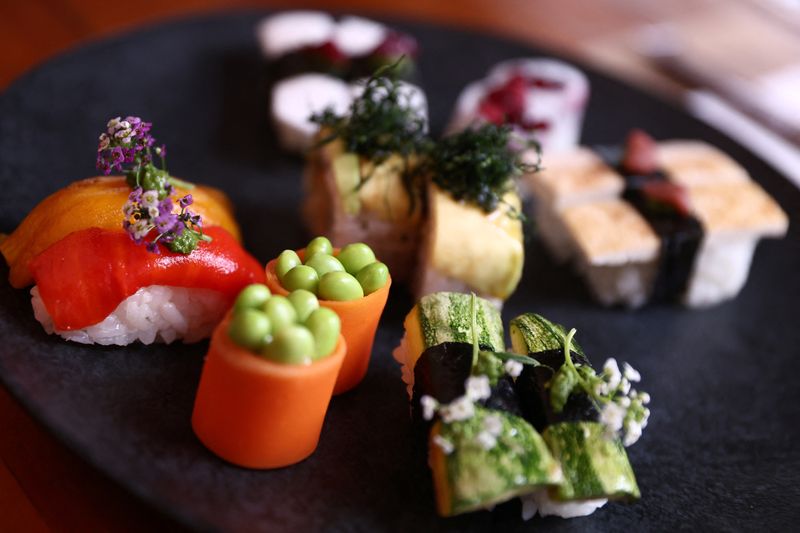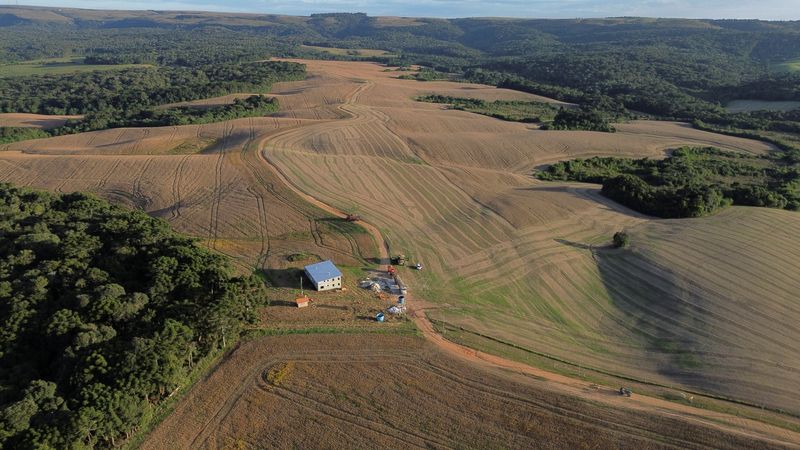By Stefanie Eschenbacher
SAO PAULO (Reuters) - Brazil's foodie hub Sao Paulo may be best known for its prized cuts of grilled meat and lavish sushi spreads, but some upscale restaurants are featuring a novel star ingredient: soy.
The agricultural powerhouse is the world's top producer of soy, shipping over a million tons a week to China on average.
But unlike in Asia and other markets where soy is synonymous with cheap everyday protein, Brazilians eat so little of it that it has become a pricey niche offering.
On their carefully curated social media pages, high-end chefs prepare tofu cubes decorated with edible flowers and edamame topping sticky rice wrapped in thinly sliced carrots.
In Sao Paulo's supermarkets, Brazilians making minimum wage would need to fork over a full day's pay for just 250 grams of tofu.
"It's a treat," said Lucinete Magalhaes, after ordering a tofu dish in a restaurant in upscale Jardins. "In Brazil, we're used to eating rice with beans every day - but we don't really view soybeans the same."
Bolivians, Nigerians and Russians consume more soy on average than Brazilians, according to agriculture consultancy Agromeris. It found Brazil was the only major market for foods made with soybeans in decline.
Jacob Golbitz, who led the study a few years ago, said it was all down to culture. "If culture ever changes, it's at a glacial pace," he said.
Mass soy production began only in the 1970s in Brazil, after new science opened the door to farming the cash crop in the country's vast, sparsely populated interior.
Outside the Asian diaspora, Brazilians who heap brown and black beans on their rice every day still look askance at the exotic green beans - nearly all of which are grown to be exported to Asia and Europe to fatten up cattle, pigs, birds and fish.
Brazil is forecast to produce a record 170 million metric tons of soy in its next harvest, compared to 125 million metric tons grown in the United States, which it surpassed in 2020.
The boom has come with environmental costs. For decades, Brazil's expanding soy frontier has contributed to deforestation in the Amazon (NASDAQ:AMZN) rainforest and the Cerrado savanna.
ELITE TASTES
"We experiment a lot with tofu, to play with contrasts, to give it flavor and texture," said Maria Cermelli, owner of the Sushimar restaurant in Jardins, a well-to-do neighborhood where locals walk dogs in custom knit sweaters past fashion boutiques. "It's still a novelty but becoming more popular."
The contrasting positions of soy in Brazil illustrate a growing divide between global supply chains for mass-produced soft commodities and the niche cultivation of bespoke produce like heirloom Mexican corn and Peruvian potatoes for elite tastes.
About 98% of Brazil's soy is genetically modified organisms (GMO) to withstand the heavy use of herbicide on industrial-scale plantations, which has added to a stigma in the local market.
So food companies offering tofu and soy milk to choosy Brazilians rely on expensive parallel farming of organic, non-GMO soybeans – or imported products from as far off as Japan – and prices are high.
"It's absurd that Brazil imports soy," said Alexandre Lima Nepomuceno from Embrapa, a research division of the Agriculture Ministry that opened the country's soybean frontier five decades ago.
"The controversy around GMO has created a situation where every country made their legislation, often highly complex and confusing, which is increasing the cost and making this an impossible business."
Brazilian law does not prohibit human consumption of GMO soybeans. However, companies go to great lengths and pay a hefty premium to source traditional soy, which for many have become synonymous with organic and healthy ingredients.
In the high-volume, low-margin business of commercial farming, it is rare to find Brazilian producers betting on the non-GMO segment.
"Creating a relevant demand for non-GMO soy is not easy," said Gus Guadagnini, Brazil CEO at The Good Food Institute, a think tank studying development of meat alternatives.
Where Brazilian companies have embraced traditional soy production, it often requires heavy investments.
Caramuru, the largest processor of the oilseed in central Mato Grosso state, deep in Brazil's agricultural heartland, has gone as far as building a separate plant for non-GMO soy.

Marcos de Melo, their agricultural inputs manager, said the parallel production was needed because the tolerance for "contamination" of GMO soybeans is below 0.1%.
However, Brazilians will not taste the final product coming off that dedicated Caramuru line. The company's non-GMO soymeal is destined for export to Europe to be used in animal feed.
